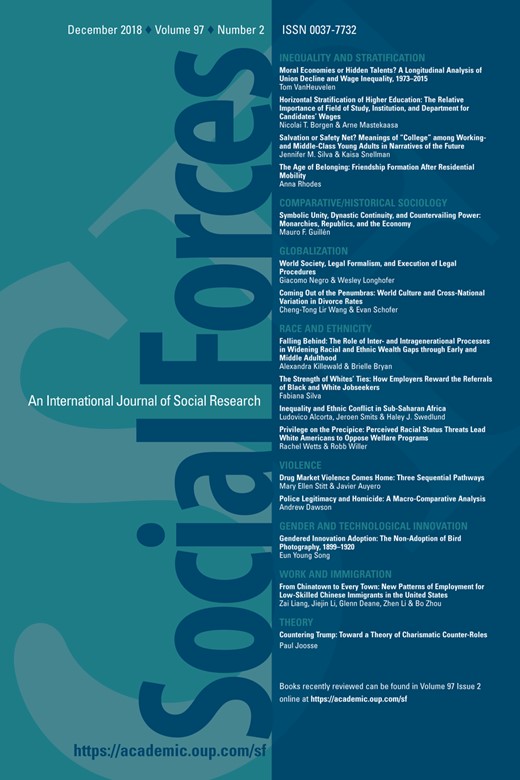-
Views
-
Cite
Cite
Rachel Wetts, Robb Willer, Privilege on the Precipice: Perceived Racial Status Threats Lead White Americans to Oppose Welfare Programs, Social Forces, Volume 97, Issue 2, December 2018, Pages 793–822, https://doi.org/10.1093/sf/soy046
Close - Share Icon Share
Abstract
Here, we integrate prior work to develop and test a theory of how perceived macro-level trends in racial standing shape whites’ views of welfare policy. We argue that when whites perceive threats to their relative advantage in the racial status hierarchy, their resentment of minorities increases. This increased resentment in turn leads whites to withdraw support for welfare programs when they perceive these programs to primarily benefit minorities. Analysis of American National Election Studies data and two survey-embedded experiments support this reasoning. In Study 1, we find that whites’ racial resentment increased beginning in 2008, the year of Barack Obama’s successful presidential candidacy and a major economic downturn, the latter a factor previously shown to amplify racial threat effects. At the same time, whites’ opposition to welfare increased relative to minorities’. In Study 2, we sought to better establish the causal effect of racial status threats. We found that experimentally presenting information suggesting that the white majority is rapidly declining increased whites’ opposition to welfare, and this effect was mediated by heightened racial resentment. Finally, in Study 3 we found that threatening whites’ sense of their economic advantage over minorities led whites to report greater opposition to welfare programs, but only if these programs were portrayed as primarily benefiting minorities, not if they were portrayed as benefiting whites. These findings suggest that whites’ perceptions that minorities’ standing is rising can produce periods of “welfare backlash” in which adoption of policies restricting or curtailing welfare programs is more likely.



